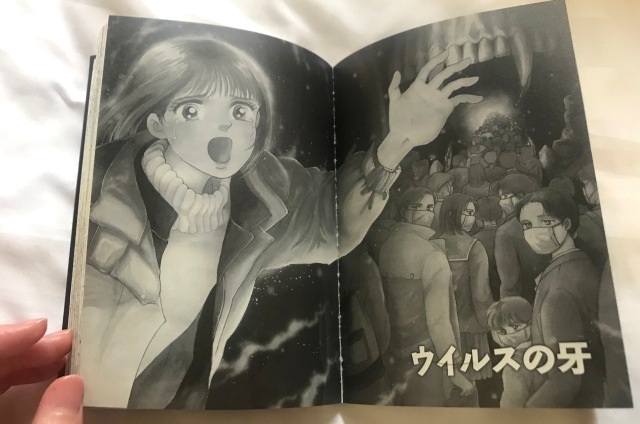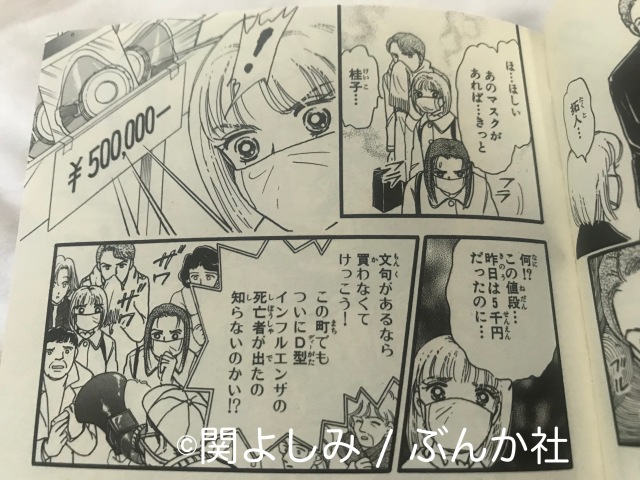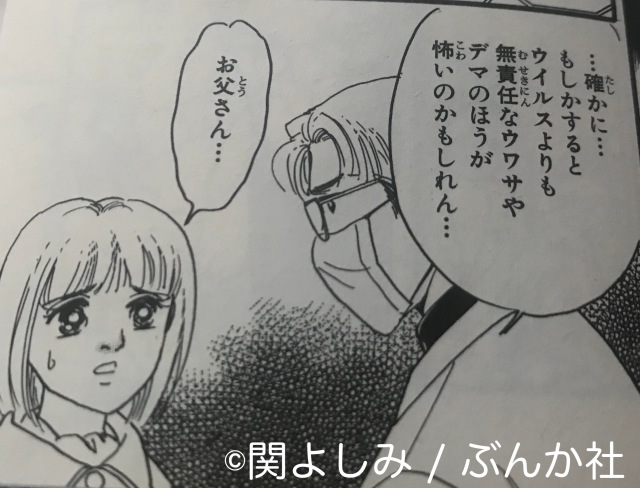
Manga artist draws amazing parallels between fiction and reality.
The last two years have thrown us all a curveball, with the coronavirus pandemic completely changing the world in ways we never could’ve predicted, making reality feel like a surreal scene from a movie or a page out of a Japanese manga.
One manga that comes to mind during these times is Virus Fang, which has become a hot topic lately for the way it depicts the pandemic-gripped society we’re currently living in. That wouldn’t be surprising if the work was written in the past couple of years, but what’s giving everyone goosebumps is the fact that it was written 25 years ago.
https://twitter.com/JAPAN_manga_bot/status/1247156675577966593That’s right — this virus-centric manga was written around a quarter of a century before the pandemic, and it reads like a prophecy for what we’re all experiencing today. Adding an extra layer of eeriness to it all is the fact that it was written by Yoshimi Seki, an acclaimed horror manga artist.
Before we get into the manga, let’s take a quick look at the author’s background. 64-year-old Seki is known for a particular style of horror that juxtaposes shojo-style manga with doomsday storylines, highlighting the gruesomeness of humankind rather than ghosts or other mysterious phenomena.
Seki’s Madhouse, for example, tells the story of a family who moves next door to a house where a murder occurred. It contains a series of shocking and surreal scenarios, including an encounter with the old man from next door, who enters the house naked, licks raw fish from the refrigerator and suddenly defecates.
▼ Madhouse
【商品情報】関よしみ傑作集マッドハウス。「マッドハウス」に登場する老人の、「うんうん、これじゃ、この味!」がイヤすぎて、何回も読んでしまいます。https://t.co/LKVXHlJeuN pic.twitter.com/CDTrMDW3YK
— 書肆鯖【ショシサバ】 (@bookssubba) November 4, 2017
Seki is a popular author with a cult following, and her works are often described as “manga that’ll leave you traumatised”. That’s certainly true of the manga currently creating a buzz online — Virus Fang, from Yoshimi Seki’s Mad Papa Masterpiece Collection.
▼ Virus Fang was first published in 1997.
The story revolves around the main character of Hitomi, a third-year junior high school student studying for the high school entrance exams, a time of intense stress for students in Japan.
Against this bubbling backdrop of stress and tension, news arrives that Influenza D, which has an extremely high infectivity and fatality rate, has spread overseas, with the number of deaths exceeding 30,000. Despite a travel ban being put in place to stop people from affected countries visiting, people in Japan end up becoming infected with the virus, and a sense of fear and panic begins to permeate towns and schools.
With no vaccine or cure in sight, people become swept up in hoaxes, including the belief that “ambulances take patients straight to the crematorium”.
What’s particularly interesting about this work is that rather than focus on the fear of the disease, it accurately depicts a world struggling to cope with the spread of a virus…and the mindset of people who are easily misled by hoaxes.
Throughout the manga, it’s clear that human psychology is more frightening than the illness itself, and this is expressed through events where:
・ People begin to scramble for masks, causing prices to skyrocket
・ Shady “virus prevention products” are sold at high prices
・ Schools close, companies close, and going out is restricted
・ The medical system collapses
・ Fear of infection sparks animosity between close friends
・ Chaos ensues everywhere due to hoaxes and rumours
It’s often said that fact is stranger than fiction, but in the case of this manga, fiction has become a true reflection of reality. Those six plot points above sound a lot like everything we’ve experienced these past two years, although the price of masks increased three-fold in Japan instead of 100-fold as they do in the manga.
▼ According to this scene, masks were 5,000 yen (US$43.40) one day, 500,000 yen the next.
While the behaviour of panicked, confused individuals plays a big role in the manga, correct preventive measures and attitudes are also addressed, through the father of the main character, who works as a pharmacist. Hitomi’s father acts as the voice of reason throughout the story, asserting from the start that people should wear masks, gargle and wash their hands as basic ways to prevent infection.
In one scene, while watching the news on TV, there’s a poignant moment between father and daughter, where he tells her:
“Perhaps irresponsible rumours and hoaxes are more frightening than viruses…”
Sadly, this father’s premonition from 25 years ago has proven to be right today.
To prevent infection during a pandemic, you don’t just need to rely on vaccines, cures, and proper hygiene. You also need to arm yourself with knowledge, in order to shield yourself from hoaxes and rumours that have no truth to them.
It’s a theme that makes its presence felt throughout the manga, and it’s one we can learn from today in this pandemic era. Fear can make people react in unusual ways, and Seki’s experience in exploring the dark side of human nature gave her a foresight into the challenges we face today.
Seki’s Virus Fang is hard to find in print, but electronic versions can be purchased online (see links below) or read for free on Kindle Unlimited. And if you’d like to check out another manga filled with pandemic predictions that reflect reality, don’t forget to take a look at Akira, which went one step further by adding the Tokyo 2020 Olympics to the prophecy.
Related: Amazon Japan, Comic Cmore, Renta!, Book Live, Manga Oukoku
Top image ©SoraNews24
● Want to hear about SoraNews24’s latest articles as soon as they’re published? Follow us on Facebook and Twitter!
[ Read in Japanese ]




 Japan has omurice chocolate, and the weirdest thing isn’t how it tastes
Japan has omurice chocolate, and the weirdest thing isn’t how it tastes Downloads of 39-year-old Guns N’ Roses song increase 12,166 percent thanks to Gundam
Downloads of 39-year-old Guns N’ Roses song increase 12,166 percent thanks to Gundam A look back on 40 years of Japanese schools banning stuff
A look back on 40 years of Japanese schools banning stuff Swapping seats on Japan’s bullet trains is not allowed, Shinkansen operator says
Swapping seats on Japan’s bullet trains is not allowed, Shinkansen operator says And now, we eat a bear paw we bought in Japan’s Chiba Prefecture【Taste test】
And now, we eat a bear paw we bought in Japan’s Chiba Prefecture【Taste test】 Japan has omurice chocolate, and the weirdest thing isn’t how it tastes
Japan has omurice chocolate, and the weirdest thing isn’t how it tastes Downloads of 39-year-old Guns N’ Roses song increase 12,166 percent thanks to Gundam
Downloads of 39-year-old Guns N’ Roses song increase 12,166 percent thanks to Gundam A look back on 40 years of Japanese schools banning stuff
A look back on 40 years of Japanese schools banning stuff Swapping seats on Japan’s bullet trains is not allowed, Shinkansen operator says
Swapping seats on Japan’s bullet trains is not allowed, Shinkansen operator says And now, we eat a bear paw we bought in Japan’s Chiba Prefecture【Taste test】
And now, we eat a bear paw we bought in Japan’s Chiba Prefecture【Taste test】 Take a trip to Japan’s Dododo Land, the most irritating place on Earth
Take a trip to Japan’s Dododo Land, the most irritating place on Earth Taiwanese Cosplayers Appear in their Droves, Show All-Out Passion for Hatsune Miku
Taiwanese Cosplayers Appear in their Droves, Show All-Out Passion for Hatsune Miku Visiting Shohei Ohtani’s official manhole lid in his hometown and more
Visiting Shohei Ohtani’s official manhole lid in his hometown and more Nakagin Capsule Tower’s rare “pink capsules”, formerly used in the sex industry
Nakagin Capsule Tower’s rare “pink capsules”, formerly used in the sex industry 35 fascinating photos of Korea from 100 years ago (before K-dramas took over Asia)
35 fascinating photos of Korea from 100 years ago (before K-dramas took over Asia) Is China’s don’t-go-to-Japan warning affecting the lines at a popular Tokyo gyukatsu restaurant?
Is China’s don’t-go-to-Japan warning affecting the lines at a popular Tokyo gyukatsu restaurant? Three beautiful places to see Japan’s plum blossoms after starting your day in downtown Tokyo
Three beautiful places to see Japan’s plum blossoms after starting your day in downtown Tokyo Cherry blossom forecasts map shows Japan’s OTHER sakura season is starting right now
Cherry blossom forecasts map shows Japan’s OTHER sakura season is starting right now Huge Evangelion Unit-01 head appearing in lights in Japan to celebrate anime’s 30th anniversary
Huge Evangelion Unit-01 head appearing in lights in Japan to celebrate anime’s 30th anniversary New Studio Ghibli stamps leave an impression on your stationery…and your heart
New Studio Ghibli stamps leave an impression on your stationery…and your heart Family Mart releases huge range of cute sweets for Cat Day in Japan
Family Mart releases huge range of cute sweets for Cat Day in Japan Japan’s first all-matcha ramen restaurant is now open in Kyoto【Photos】
Japan’s first all-matcha ramen restaurant is now open in Kyoto【Photos】 Japan’s most famous Mt. Fuji view park cancels cherry blossom festival because of overtourism
Japan’s most famous Mt. Fuji view park cancels cherry blossom festival because of overtourism Starbucks Japan releases new drinkware and goods for Valentine’s Day
Starbucks Japan releases new drinkware and goods for Valentine’s Day Japan releases first official sakura cherry blossom forecast for 2026
Japan releases first official sakura cherry blossom forecast for 2026 Archfiend Hello Kitty appears as Sanrio launches new team-up with Yu-Gi-Oh【Pics】
Archfiend Hello Kitty appears as Sanrio launches new team-up with Yu-Gi-Oh【Pics】 China’s don’t-go-to-Japan warning looks to be affecting tourist crowds on Miyajima
China’s don’t-go-to-Japan warning looks to be affecting tourist crowds on Miyajima Starbucks Japan releases new Frappuccino and latte for Valentine’s Day
Starbucks Japan releases new Frappuccino and latte for Valentine’s Day Studio Ghibli releases new “komorebi” plush toys from Princess Mononoke and Spirited Away
Studio Ghibli releases new “komorebi” plush toys from Princess Mononoke and Spirited Away Yokai are descending upon Tokyo this spring in the latest immersive art experience
Yokai are descending upon Tokyo this spring in the latest immersive art experience Japan’s Naruto theme park now offering real-world version of Minato’s kunai ninja weapon
Japan’s Naruto theme park now offering real-world version of Minato’s kunai ninja weapon Our 52-year-old pole dancing reporter shares his tips for achieving your New Year’s exercise goal
Our 52-year-old pole dancing reporter shares his tips for achieving your New Year’s exercise goal Survey asks foreign tourists what bothered them in Japan, more than half gave same answer
Survey asks foreign tourists what bothered them in Japan, more than half gave same answer Japan’s human washing machines will go on sale to general public, demos to be held in Tokyo
Japan’s human washing machines will go on sale to general public, demos to be held in Tokyo We deeply regret going into this tunnel on our walk in the mountains of Japan
We deeply regret going into this tunnel on our walk in the mountains of Japan Studio Ghibli releases Kodama forest spirits from Princess Mononoke to light up your home
Studio Ghibli releases Kodama forest spirits from Princess Mononoke to light up your home Major Japanese hotel chain says reservations via overseas booking sites may not be valid
Major Japanese hotel chain says reservations via overseas booking sites may not be valid Put sesame oil in your coffee? Japanese maker says it’s the best way to start your day【Taste test】
Put sesame oil in your coffee? Japanese maker says it’s the best way to start your day【Taste test】 No more using real katana for tourism activities, Japan’s National Police Agency says
No more using real katana for tourism activities, Japan’s National Police Agency says Starbucks Japan reveals new sakura drinkware collection, inspired by evening cherry blossoms
Starbucks Japan reveals new sakura drinkware collection, inspired by evening cherry blossoms Updated cherry blossom forecast shows extra-long sakura season for Japan this year
Updated cherry blossom forecast shows extra-long sakura season for Japan this year Take a trip to Japan’s Dododo Land, the most irritating place on Earth
Take a trip to Japan’s Dododo Land, the most irritating place on Earth Taiwanese Cosplayers Appear in their Droves, Show All-Out Passion for Hatsune Miku
Taiwanese Cosplayers Appear in their Droves, Show All-Out Passion for Hatsune Miku Visiting Shohei Ohtani’s official manhole lid in his hometown and more
Visiting Shohei Ohtani’s official manhole lid in his hometown and more Nakagin Capsule Tower’s rare “pink capsules”, formerly used in the sex industry
Nakagin Capsule Tower’s rare “pink capsules”, formerly used in the sex industry 35 fascinating photos of Korea from 100 years ago (before K-dramas took over Asia)
35 fascinating photos of Korea from 100 years ago (before K-dramas took over Asia) Limited-time One Piece-themed Wonda canned coffees are now on sale in Japan!
Limited-time One Piece-themed Wonda canned coffees are now on sale in Japan! Time to open the final Village Vanguard Luck Bag of 2026, the magical girl Red Lucky Bag
Time to open the final Village Vanguard Luck Bag of 2026, the magical girl Red Lucky Bag Japan manners debate: Is it OK to put a Mister Donut donut back on the shelf after taking it?
Japan manners debate: Is it OK to put a Mister Donut donut back on the shelf after taking it? Tokyo pub explicitly soft-bans customers older than 39 from entering
Tokyo pub explicitly soft-bans customers older than 39 from entering 7-Eleven pancakes become a hit with American tourists in Japan
7-Eleven pancakes become a hit with American tourists in Japan Real-life Ghost of Tsushima shrine announces ban of all “tourists,” but there’s some fine print
Real-life Ghost of Tsushima shrine announces ban of all “tourists,” but there’s some fine print New Studio Ghibli stamps leave an impression on your stationery…and your heart
New Studio Ghibli stamps leave an impression on your stationery…and your heart
Leave a Reply